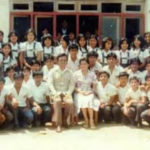By Jourdan Reynolds
Recently in the Gospel readings at Mass, we recounted the famous question that Jesus asked the apostles, “Who do you say that I am?” We read that the Apostles gave various answers, but it is Peter who gives the resonating answer, proclaiming that Jesus is the Messiah and the son of God. As I reflected upon this passage and focused on who Jesus is to me, I also reflected on another question: Who do I say that I am?
When I tell people that I was born in South Korea and adopted as an infant, people seem so amazed by my story. I am too, but I suppose my sensitivity with the subject limits my enthusiasm. No longer do I struggle not knowing who my birth parents are, nor their reasons for giving me up for adoption. However, other cultural aspects like food and language still bother me. Being allergic to shellfish, the number of Korean dishes I can enjoy is limited. And though I can still enjoy dishes like Bulgogi, an authentic Korean barbecue, it hurts me that I can’t enjoy the full list of culinary delights that belong to my native country.
 At the same time, I wish I knew the language of my people. I know a few phrases in Korean, but without having a school to teach it, or a Koreatown close by, it’s quite difficult to stay fluent in the language. And so, I was presented with an identity crisis of sorts in terms of culture. Luckily, God had a plan to take care of all this.
At the same time, I wish I knew the language of my people. I know a few phrases in Korean, but without having a school to teach it, or a Koreatown close by, it’s quite difficult to stay fluent in the language. And so, I was presented with an identity crisis of sorts in terms of culture. Luckily, God had a plan to take care of all this.
One day, meditating in prayer, God revealed to me that maybe it wasn’t my parents’ intention for me to follow the Korean culture completely. Maybe, they wanted me to embrace it according to my own desires, but to also acquire the cultures of others and make them my own. And wouldn’t you know it, I had already been doing just that.
My upbringing in Wisconsin by parents from small towns in Iowa has developed within me values relative to the Midwest. I am proud to be a “Midwesterner” and be familiar with small town living. Likewise, my devotion to Mary as Our Lady of Guadalupe instilled within me a love for Mexico and that of Latin America. After learning the history of Asian immigration to Mexico through the Manila-Acapulco Galleon Trade, and that of the Koreans in the Yucatán Peninsula, my heart found rest in identifying with these immigrants.
Additionally, I found solace among the saints of the Catholic faith. One in particular that supports my connection with Latin America is St. Oscar Romero, Archbishop of El Salvador. He tirelessly fought for the rights of the poor and equality among all. His feast day happens to be the day of my birthday, March 24. And so, I consider him a special saint of my identity.
Lastly, about four years ago, I took a DNA test and found out that my ancestors were not solely from Korea. In fact, they had only been there for a couple of generations. My bloodline comes from Japan and China before then. So, in reality I’m not only Korean, but Japanese and Chinese too. I’m proud to be all three.
So when someone asks me, “Who do you say that you are,” I will reply, “I am many things, but first and foremost I am a Catholic and I am a child of God.”
(Jourdan Reynolds is the secretary and bookkeeper at St. Mary of the Visitation Parish in Ottumwa.)











